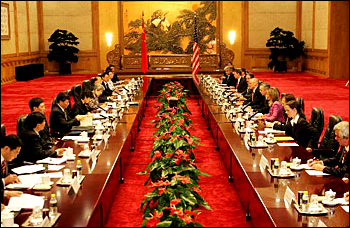| Tools: Save | Print | E-mail | Most Read |
| China, US Launch Strategic Economic Dialogue |
| Adjust font size: |
Chinese Vice Premier Wu Yi and US Secretary of Treasury Henry Paulson announced on Wednesday the establishment of a China-US economic strategic dialogue. "The dialogue will involve the highest official levels and is the first of its kind," according to a fact sheet accompanying the joint statement on the dialogue. Wu and Paulson will co-chair the dialogue as special representatives of Chinese President Hu Jintao and US President George W. Bush respectively. It will examine long-term strategic issues, and provide coordination for other specialized dialogues. They said the two nations should enhance the strategic dialogue in the economic field, which is conducive to bilateral economic cooperation and the two countries' constructive and cooperative relations. The dialogue will also have a positive influence on global economic development and international security, they said.
The dialogue mechanism was established on the basis of a consensus reached between the two presidents, Wu said. "What the Chinese government is doing and the pace of change is remarkable," Paulson said. "This time I came here to encourage Chinese leaders to move forward the reform of the capital market." Depicting the dialogue mechanism as a "unique opportunity and great initiative" that "reflects the 21st century global economy and redefines the US-China economic relationship", Paulson said he would work with the Chinese leadership to make this dialogue "practical", and strengthen the long-term economic relationship between the two countries. The dialogue will convene twice a year in Beijing and Washington, with the first meeting to be held before the end of 2006. Paulson noted that the mechanism sends a message that the two countries are working to establish a "mutually beneficial relationship" to decrease economic risks, as well as political and security risks. He also called on the two countries, as "global economic leaders", to treat global economic challenges in a "responsive, constructive and creative way." The existing China-US dialogue and consultation mechanisms, such as the Joint Commission on Commerce and Trade, Joint Economic Committee, and Joint Commission on Science and Technology, remain unchanged. "The new mechanism is a rational choice for China and the US," said Mei Xinyu from the Trade Research Institute of the Ministry of Commerce. "The mechanism provides a good opportunity for both sides to fully contact and exchange views with each other, and will play a positive role in ameliorating communicative channels and reducing conflicts between the two sides," he said. This economic strategic dialogue is not Paulson's only achievement in China since he took office as Treasury Secretary in July. During Paulson's stay in Beijing, Chinese President Hu Jintao and Premier Wen Jiabao will meet with him. Officials from the National Development and Reform Commission and the ministries of finance, commerce, health, and information industry are also scheduled to meet with Paulson. "I will talk with them on different and very important sets of issues," Paulson told reporters after his meeting with Wu. The former chairman of Goldman Sachs, the world's leading investment bank, knows China very well. Before becoming Treasury chief in July, he had visited China more than 70 times to broker lucrative deals for the bank. His approach toward China is rational, but whether his suggestions would be applied in practice under the current US system is still unknown, Mei said. The problems between China and the US in the economic field are rather complicated, which cannot be solved in one or two visits, Mei added.
(Xinhua News Agency September 21, 2006) |
| Tools: Save | Print | E-mail | Most Read |
 |
| Related Stories |
| Product Directory China Search |
Country Search Hot Buys |


